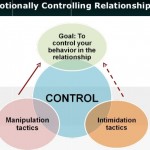Every couple fights.
Even the strongest long-term relationships have their own season of arguments that can get angry word-winds to fly about. However, after the sh*t’s hit the fan, most mature partners tend to stay back to clean the stinky mess they have been equally responsible for. And while it may, sometimes, be a good idea to avoid the mess altogether, conflict avoidance isn’t always the best way to agree to disagree. Conflicts are a healthy component of every relationship and it is not only inevitable but necessary that you engage in the very processes that lead unto a satisfactory resolution. However, did you know that you need more than a healthy understanding of the significance of conflicts and the techniques to handle them to be able to kiss and make up at the end? Did you know that the ways that you handle conflict could determine if your kiss and make up strategies are healthy for the long run or simply, a temporary cessation for the drama?

Image source: Google, copyright-free image under Creative Commons License
Suggested read: How important is it to set boundaries in a relationship?
If you are as intrigued as I was when I first stumbled upon the research, here’s the lowdown on recent scientific findings that point out the key processes one can deploy for a healthy conflict resolution. University of Kansas psychologists Evangelia Chrysikou and W. Jake Thompson consider empathy as a pivotal component of successful interpersonal relationships. Since, empathy remains an intangible component of relationships, extremely difficult to quantify, Chrsyikou and Thompson take to IRI or the Interpersonal Receptivity Index, a tool established by Eckerd College’s Mark Davis. Consisting of four factors namely, perspective taking (the ability to see another’s point of view), empathetic concern (feeling an all-enveloping sense of warmth and compassion), fantasy (the ability to imagine a fictional situation and put yourself in it) and personal distress (feeling the pain of another in a troublesome situation), this hierarchical factor structure of IRI was investigated with the Schmid-Leiman orthogonalization procedure (Schmid & Leiman, 1957). The sample consisted of 409 college students. The analysis found that the IRI could be factored into four first-order factors, Self Report Measures for Love and Compassion Research: Empathy corresponding to the four scales of the IRI, and two second-order orthogonal factors, a general empathy factor and an emotional control factor.
Here’s the entire test:
The following statements inquire about your thoughts and feelings in a variety of situations. For each item, indicate how well it describes you by choosing the appropriate letter on the scale at the top of the page: A, B, C, D, or E. When you have decided on your answer, fill in the letter next to the item number. READ EACH ITEM CAREFULLY BEFORE RESPONDING.
Answer as honestly as you can.
ANSWER SCALE: A- does not describe me very well B C D E- describes me very well
- I daydream and fantasize, with some regularity, about things that might happen to me. (FS)
- I often have tender, concerned feelings for people less fortunate than me. (EC)
- I sometimes find it difficult to see things from the “other guy’s” point of view. (PT) (-)
- Sometimes I don’t feel very sorry for other people when they are having problems. (EC) (-)
- I really get involved with the feelings of the characters in a novel. (FS)
- In emergency situations, I feel apprehensive and ill-at-ease. (PD)
- I am usually objective when I watch a movie or play, and I don’t often get completely caught up in it. (FS) (-)
- I try to look at everybody’s side of a disagreement before I make a decision. (PT)
- When I see someone being taken advantage of, I feel kind of protective towards them. (EC)
- I sometimes feel helpless when I am in the middle of a very emotional situation. (PD)
- I sometimes try to understand my friends better by imagining how things look from their perspective. (PT)
- Becoming extremely involved in a good book or movie is somewhat rare for me. (FS) (-)
- When I see someone get hurt, I tend to remain calm. (PD) (-)
- Other people’s misfortunes do not usually disturb me a great deal. (EC) (-)
- If I’m sure I’m right about something, I don’t waste much time listening to other people’s arguments. (PT) (-)
- After seeing a play or movie, I have felt as though I were one of the characters. (FS)
- Being in a tense emotional situation scares me. (PD)
- When I see someone being treated unfairly, I sometimes don’t feel very much pity for them. (EC) (-)
- I am usually pretty effective in dealing with emergencies. (PD) (-)
- I am often quite touched by things that I see happen. (EC)
- I believe that there are two sides to every question and try to look at them both. (PT)
- I would describe myself as a pretty soft-hearted person. (EC)
- When I watch a good movie, I can very easily put myself in the place of a leading character. (FS)
- I tend to lose control during emergencies. (PD)
- When I’m upset at someone, I usually try to “put myself in his shoes” for a while. (PT)
- When I am reading an interesting story or novel, I imagine how I would feel if the events in the story were happening to me. (FS)
- When I see someone who badly needs help in an emergency, I go to pieces. (PD)
- Before criticizing somebody, I try to imagine how I would feel if I were in their place. (PT)
NOTE: (-) denotes item to be scored in reverse fashion
PT = perspective-taking scale
FS = fantasy scale
EC = empathic concern scale
PD = personal distress
scale A = 0 B = 1 C = 2 D = 3 E = 4
Except for reversed-scored items, which are scored: A = 4 B = 3 C = 2 D = 1 E = 0
Please note the entire test has been reproduced from fetzer.org.
Suggested read: Setting boundaries in an abusive relationship
While previous researchers have broken down the four factors into two categories involving cognitive empathy that includes perspective-taking and fantasy, and affective empathy combines empathic concern and personal distress, Chyrsikou and Thompson are more interested in testing the cognitive component involving cognitive processes and the affective component involving emotional components and processes separately. However, upon testing the results and scores of over 417 participants, it was determined that IRI is best understood as an amalgam of all four components.
Keeping the same in mind, the researchers proposed four distinct models of kiss and make up techniques that can include empathy in conflict resolution in an optimal manner:
Perspective taking

Image source: Pinterest
Usually, it takes an ebb in anger levels to be able to see things clearly. However, it is important that you take the time to assess the situation from your partner’s perspective. Use perspective-taking as a crucial tool to analyze how the situation looks to your partner, understand his/her point of view and then, assess if your approach is appropriate. Try answering questions like ‘would you like it if you were in his/her place and he/she were behaving like you are?’ or ‘does any degree of hurt give me the right to inflict pain in return?’ You shall be surprised how a simple technique of putting yourself in another’s shoes can turn the whole situation around.
Empathetic concern
Take a moment to feel your partner’s pain. Even if you have objectively assessed the situation and feel that the hurt is something that your partner have brought upon themselves, that does not give you the right to throw it in their face. Be kind, turn down your defensive and understand that your partner is hurt, unhappy or even tearful. Open up to compassionate consideration of their emotional state and let logic watch from the sides.
Fantasy
The fantasy component allows you to draw out your empathy if you aren’t able to feel it in reality. If the same were happening to a fictional character in a book, play or movie, would you be able to empathize with their ‘sorry state?’ If yes, then there is no reason for you to hold back from extending the same courtesy to your partner. Just because you aren’t a distant third-party spectator does not mean that your emotional attachment to your partner should ‘detach’ you from their suffering.
Personal distress

Image source: Tumblr
If you tend to lose control in the heat of the moment, imagine what you’d do if a beloved was actually suffering during an exigency. This might help you push past the immediacy of the argument and see the bigger picture.
Suggested read: 8 definite signs to help you figure out if you’re dating a cheater
Empathy skills can come in all shapes and sizes and it isn’t necessary that both of you may be on the same level. However, it does take a conscious effort to sync in your empathy scales in order to become more aware of each other’s emotional states of being and understand another’s feelings.
Being able to tap into all four components makes for healthy conflict resolution. If your kiss and make up technique involves all four elements, we say that the kiss that seals your ‘make up’ is going to go a long, long way!
Featured image source: Tumblr












